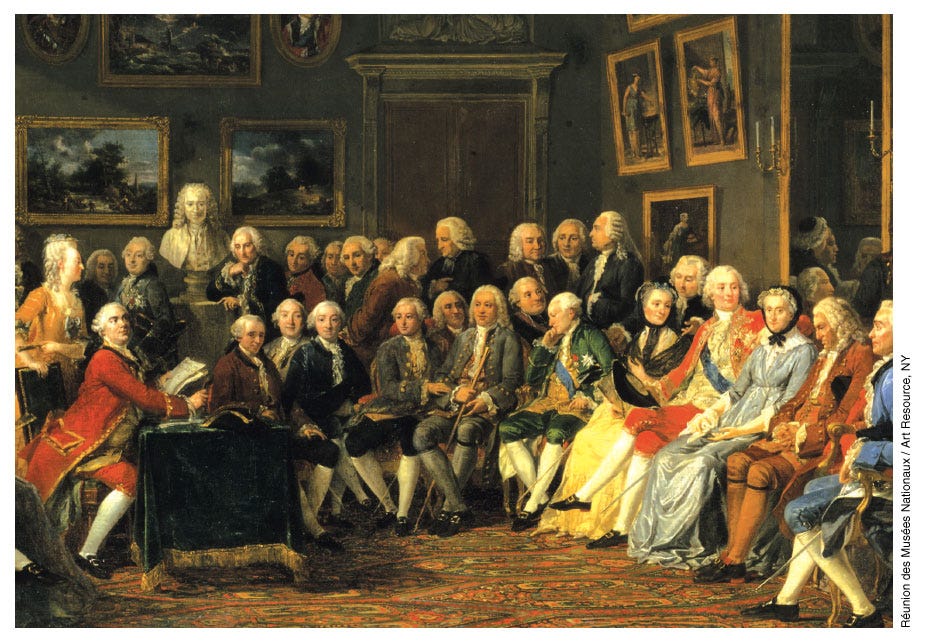Enlightenment: The Legacy and Its Impact
The modern era, often heralded as the dawn of Enlightenment, began in the 16th century with a significant intellectual shift in Western thought. Rooted in ancient philosophy, this transformation reinvigorated old ideas with new vigor, placing science and knowledge at the forefront (Hufton, 1977; Zafirovski, 2010; O'Brien, 2010).
This movement, echoing the profound insights of Aristotle and his contemporaries, spurred a radical reevaluation of societal functions, individual freedoms, and the distribution of power and wealth (Tenkasi et al., 2008; Kandiah, 2017). For over two centuries, philosophers like Hobbes, Montesquieu, and Rousseau spearheaded a revolution in thinking that propelled us from medieval confines into contemporary consciousness (Frick, 1992).
The ripple effects of this intellectual awakening touched every aspect of life, from the general public to academia, from social movements to markets (Loque, 2008). A newfound skepticism led individuals to scrutinize their selves and their place within the social fabric and question longstanding economic and political norms (Matytsin, 2016). Universities began to embrace science as the engine of progress, fostering a wave of innovation that has continued transforming our lives (Vignais et al., 2010).
Amidst this progress, the unions and social movements began to organize around rights and equality ideals, forming coalitions to advocate for equal rights, opportunities, and social protections (Henry & Jensen, 1991). These societal shifts also fueled economic growth, catalyzing unprecedented market expansion and colonial trade. Economic liberalism, coupled with an enlightened public and the spread of commerce, contributed to a new, empowered middle class that would challenge the vestiges of absolute monarchy in France, Britain, and later the fledgling United States in the late 18th century (Grier, 1991; Booth, 2015; De Sousa & Lochard, 2012).
The Enlightenment's influence on democracy, mainly through the philosophical contributions of Hobbes, Locke, and Rousseau, is palpable in the founding principles of the U.S. Constitution. This intellectual and democratic wave paved the way for Western hegemony, facilitating colonial expansions that reshaped the world order (Mosher & Plassart, 2022; Bourke, 2008).
However, this reflective glance at Western achievements raises poignant inquiries for the Global East. As they stand on the precipice of scientific and technological revolutions pioneered by the West (Hobson, 2006), one must ask how these history lessons will inform their path. The Enlightenment, after all, is not just a Western narrative but a global legacy that continues to challenge our "collective conscience" (Nykänen, 2014).
As we reflect on the Enlightenment's legacy, we must consider its complex implications, not only for the historical West but for a modern world grappling with the echoes of its philosophy. The dialogue between the past and the present, the West and the East, remains as vital as ever, urging us to ponder deeply about our direction.
References:
Booth, A. (2015). Trade and Growth in the Colonial and Post-colonial Periods. Promises and Predicaments: Trade and Entrepreneurship in Colonial and Independent Indonesia in the 19th and 20th Centuries, 17.
Bourke, R. (2008). Enlightenment, revolution, and democracy. Constellations, 15(1), 10-32.
De Sousa, J., & Lochard, J. (2012). Trade and colonial status. Journal of African Economies, 21(3), 409-439.
Frick, C. C. (1992). The Enlightenment. The Regents: University of California.
Grier, R. M. (1999). Colonial legacies and economic growth. Public Choice, 98(3-4), 317-335.
Henry, D., & Jensen, R. J. (1991). Social movement criticism and the renaissance of public address. Communication Studies, 42(1), 83-93.
Hobson, J. (2006). East and West in global history. Theory, Culture & Society, 23(2-3), 408-410.
Hufton, O. (1977). The EnlightenmentEnlightenment and its Influences. The Historical Journal, 20(4), 971-976.
Kandiah, S. (2017). Enduring Aristotle: A Prefatory Study on His Legacy of Ethics and Aesthetics. Journal on English Language Teaching, 7(3), 1-6. Tenkasi, R. R. V., & Hay, G. W. (2008). Following the second legacy of Aristotle. Handbook of collaborative management research, 49-71.
Loque, F. F. (2008). Skepticism from the Renaissance to the Enlightenment. RIVISTA DI STORIA DELLA FILOSOFIA, (2008/2).
Matytsin, A. M. (2016). The Specter of Skepticism in the Age of Enlightenment. JHU Press.
Mosher, M., & Plassart, A. (Eds.). (2022). A cultural history of democracy in the age of Enlightenment. Bloomsbury Publishing.
Nykänen, H. (2014). Conscience and collective pressure. Philosophy, Psychiatry, & Psychology, 21(1), 51-65.
O'Brien, K. (2010). The return of the Enlightenment. The American Historical Review, 115(5), 1426-1435.
Vignais, P. V., Vignais, P. M., Vignais, P. V., & Vignais, P. M. (2010). The Roots of Experimental Science from Ancient Greece to the Renaissance. Discovering Life, Manufacturing Life: How the experimental method shaped life sciences, 7-47.
Zafirovski, M. (2010). The Enlightenment and its effects on modern society. Springer Science & Business Media.




